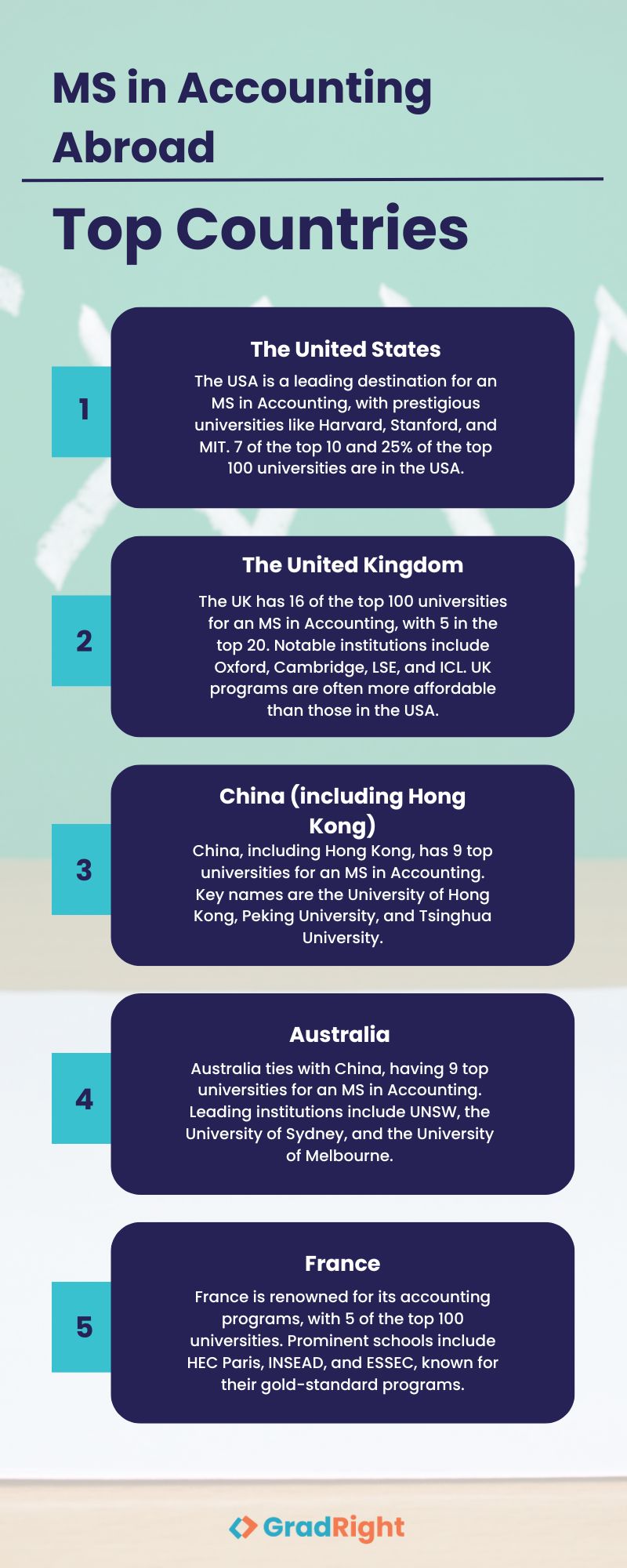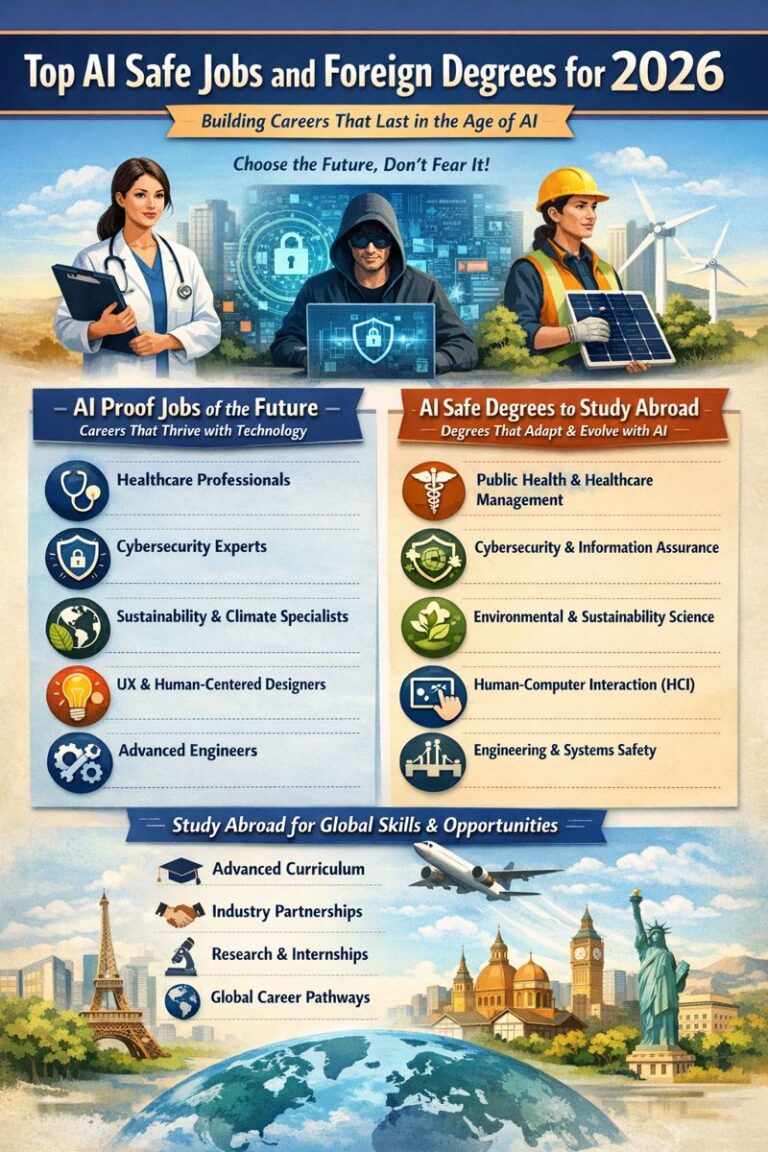In the modern job market, an MS in Accounting abroad has become a very popular program, especially for finance professionals who wish to fast-track their career progression based on advanced academics. This degree gives students the advanced skills required to work in a high-paying and heavily regulated industry and also increases their earning potential significantly.
The MS in Accounting program requires strong analytical and mathematical skills, as well as proficiency in accounting software and tools. The curriculum for MS in Accounting programs covers courses in financial reporting, taxation, auditing, standards, and accounting principles. Because of the multi-faceted program design, the graduates of these programs work in many industries, in many different roles. The job opportunities after an MS in Accounting abroad are also very lucrative, which is another big reason why people choose this degree. For instance, in corporate finance, accountants analyze financial statements to assess profitability and guide strategic decisions, while in public accounting, they may conduct audits to ensure compliance with regulations.
Many students who choose to study an MS in Accounting abroad also prepare for the CFA (Chartered Financial Analyst) or CPA (Chartered Public Accountant) certification alongside their degrees.
When you couple your MS in Accounting course with one of those certifications, you instantly become employable for top companies. Now, many countries are a top choice for this degree, each with its unique benefits. Let’s get started by learning where you should study your MS in Accounting abroad.
Top countries to study an MS in Accounting in:
We’ve looked at the top 100 universities (globally) for Master’s in Accounting programs, as ranked by the 2024 QS World University Rankings. We found that more than 80% of the world’s top universities are in the following countries:
The United States
For an MS in Accounting abroad, the USA stands head and shoulders above the rest. Home to massively prestigious universities like Harvard, Stanford, and MIT, the USA has long been a popular choice for Master’s programs, especially for Indian students. 7 of the top 10 universities for an MS in Accounting abroad are in the United States. Overall, if we consider the top 100 universities, 1 in every 4 are in the USA.
The United Kingdom
16 of the global top 100 universities for an MS in Accounting abroad are in the United Kingdom. Out of those, 5 are in the top 20. Notable names are Oxford, Cambridge, the London School of Economics (LSE), and Imperial College London (ICL). Another noteworthy point is that MS in Accounting programs in the UK are often more affordable than their USA counterparts.
China (including Hong Kong)
Perhaps a surprising entry on this list, the next best place to study an MS in Accounting abroad is China. When you include the Chinese state of Hong Kong, a total of 9 of the top universities for an MS in Accounting are in the country. Key names include the University of Hong Kong, Peking University, and Tsinghua University.
Australia
Australia ties with China, with 9 of the top 100 universities for an MS in Accounting. The best-known universities that offer the MS in Accounting program in Australia are the University of New South Wales (UNSW), the University of Sydney (UoS), and the University of Melbourne (UMelbourne).
France
France is one of the best countries in the world for international students to pursue higher education in Finance and Accounting. Home to schools like HEC Paris, INSEAD, and ESSEC, the country has a strong reputation for gold-standard accounting programs. 5 of the top 100 universities for an MS in Accounting are in France.

As you can see, the USA leads the pack with 25 of the top 100 universities renowned for their MS in Accounting programs. Most MS in Accounting programs in the USA are STEM-designated. This allows graduates to apply for an Optional Practical Training (OPT) extension, which would let them work in the USA for an additional 24 months beyond the usual 12 months, after graduating.
The other countries on this list only offer post-graduate work permits for one or two years. As a result, the USA is the best country to study an MS in Accounting abroad for international students.
Next, let’s look at the best schools to study in.
Top universities in the world for an MS in Accounting
Here is the list of the top 25 universities in the world for an MS in Accounting, according to the QS World University Rankings for 2025:
| Rank | University | Location | School / Department | Program |
| 1 | Harvard University | Cambridge, United States | Harvard Business School | Master of Accounting and Management |
| 2 | Massachusetts Institute of Technology (MIT) | Cambridge, United States | Sloan School of Management | Master of Finance (with Accounting focus) |
| 3 | Stanford University | Stanford, United States | Graduate School of Business | MBA (Accounting) |
| 4 | University of Oxford | Oxford, United Kingdom | Saïd Business School | MSc in Financial Economics (with Accounting) |
| 5 | University of Chicago | Chicago, United States | Booth School of Business | MS in Accounting |
| 6 | The London School of Economics and Political Science (LSE) | London, United Kingdom | Department of Accounting | MSc in Accounting and Finance |
| 7 | University of Cambridge | Cambridge, United Kingdom | Judge Business School | Master of Finance (Accounting) |
| 8 | University of Pennsylvania | Philadelphia, United States | Wharton School of the University of Pennsylvania | Master of Accounting |
| 9 | University of California, Berkeley (UCB) | Berkeley, United States | Haas School of Business | Master of Financial Engineering (Accounting) |
| 10 | New York University (NYU) | New York City, United States | Stern School of Business | MSc Accounting |
| 11 | Columbia University | New York City, United States | Columbia Business School | MSc Accounting and Fundamental Analysis |
| 12 | Yale University | New Haven, Connecticut, United States | Yale School of Management | Master of Advanced Management (with Accounting focus) |
| 13 | London Business School | London, United Kingdom | London Business School | Master’s in Financial Analysis (with Accounting) |
| 14 | National University of Singapore (NUS) | Singapore, Singapore | NUS Business School | Master of Accounting |
| 15 | University of Toronto | Toronto, Canada | Rotman School of Management | Master of Management Analytics (Accounting focus) |
| 16 | University of California, Los Angeles (UCLA) | Los Angeles, United States | Anderson School of Management | Master of Accounting |
| 17 | Bocconi University | Milan, Italy | SDA Bocconi School of Management | MSc Accounting, Financial Management and Control |
| 18 | HEC Paris Business School | Paris, France | HEC Paris | Master in Accounting, Audit and Control |
| 19 | Peking University | Beijing, China (Mainland) | Guanghua School of Management | Master of Management in Accounting |
| 20 | Imperial College London | London, United Kingdom | Imperial College Business School | MSc in Finance (with Accounting focus) |
| 21 | The University of New South Wales (UNSW Sydney) | Sydney, Australia | UNSW Business School | Master of Professional Accounting |
| 22 | Nanyang Technological University, Singapore (NTU Singapore) | Singapore | Nanyang Business School | Master of Professional Accounting |
| 23 | The University of Manchester | Manchester, United Kingdom | Alliance Manchester Business School | MSc Accounting |
| 24 | The University of Melbourne | Parkville, Australia | Melbourne Business School | Master of Accounting |
| 25 | Tsinghua University | Beijing, China (Mainland) | School of Economics and Management | Master of Accounting |
Each of these 25 universities is excellent for pursuing an MS in Accounting, but admissions to these institutions are highly competitive. The good news is that there are hundreds of more universities across the top countries for an MS in Accounting. The challenge for students is identifying the right universities to apply to. Comparing universities on similar criteria becomes very difficult, leading most students to apply to a few known names or universities recommended by friends. In doing so, many students miss out on what might have been the best higher education opportunity in accounting for them.
Because this decision can be life-changing, getting it right is very important. This is where SelectRight can help. SelectRight uses cutting-edge AI to match student profiles with over 40,000 programs from across the world using 8 million+ data points. This ensures that the decision about which university to attend is based on data and not just opinions.
Here’s how SelectRight works:
- Create your free profile on SelectRight and provide all the necessary information.
- Let the algorithm work and generate a shortlist of the best-suited universities and programs for you.
- Compare the universities on advanced criteria such as alumni network, recent placements, and more.
- Get help from an expert advisor from SelectRight at any stage of your application process.
- After choosing the right university, talk to peers who are going to the same university, alumni from the university, and faculty members to get answers to your questions.
If you are targeting Spring 2025 admissions, now is the perfect time to get your profile set up and find out which university is right for you. Sign up on SelectRight today and make the best choice for your future.
Next up, let’s understand what you’ll be learning as part of your MS in Accounting program.
Course curriculum for an MS in Accounting
While each university customizes and tailors its course curriculum, certain core topics are common across most programs due to the nature of the degree.
Here is a typical MS in Accounting syllabus:
| Core Course | Skills Acquired | Description |
| Financial Accounting | Understanding financial statements and accounting principles | Found in all programs, this course covers the preparation and interpretation of financial statements according to generally accepted accounting principles (GAAP). |
| Managerial Accounting | Decision-making and internal financial management | Included in all programs, this component focuses on using accounting information for internal planning, control, and decision-making within organizations. |
| Auditing | Conducting audits and ensuring compliance | Taught in most programs, this course covers the principles and practices of auditing, including risk assessment, internal controls, and compliance with regulations. |
| Taxation | Navigating tax laws and regulations | Common in all curriculums, this topic covers federal, state, and local tax laws, tax planning strategies, and the preparation of tax returns. |
| Accounting Information Systems | Managing accounting data and systems | Included in most programs, this course teaches the use of information technology in managing accounting data, including software applications and system controls. |
| Financial Reporting and Analysis | Analyzing financial data for stakeholders | Found in all programs, these courses focus on interpreting and analyzing financial statements to provide insights for stakeholders. |
| Corporate Governance & Business Ethics | Ethical decision-making in accounting | Covered in most curriculums, this component emphasizes ethical considerations and corporate governance in accounting practices. |
| Advanced Accounting | Complex accounting issues | Taught in most programs, these courses address advanced topics such as consolidations, foreign currency transactions, and partnerships. |
| Capstone Project/Internship | Practical application of accounting knowledge | Most programs include a mandatory internship or capstone project to provide hands-on experience in applying accounting principles in real-world settings. |
| Communication & Professional Development | Effective communication and professional skills | Common in many programs, this course teaches students how to communicate accounting information effectively and develop professional skills for career advancement. |
Now that your MS in Accounting subjects are out of the way, let’s take a look at the basic eligibility for getting admission to one of these programs.
Eligibility for studying an MS in Accounting
Just like for curriculum, each university may have differing entry requirements. However, here are the basic qualifications you will generally need for admission:
- A bachelor’s degree from an accredited institution
- Advanced MS Excel knowledge
- Good scores in standardized academic tests (GRE or GMAT)
- Good scores in English proficiency tests (TOEFL or IELTS) for non-native speakers
- Two professional or academic recommendations (Letters of Recommendation)
- Statement of Purpose (SOP)
- Work Experience in relevant fields (beneficial but not required)
You’ll notice we haven’t touched on GMAT or GRE scores. This is because they are not always required, and we explain more about them in the next section.
GMAT/GRE requirements for studying an MS in Accounting
For an MS in Accounting, most universities consider your academic background and work experience when evaluating your application.
While some programs may not require standardized test scores, you will likely need to submit GMAT or GRE scores if you haven’t worked in Finance, if your undergraduate GPA was less than 3.0 (average across all years), or if your undergraduate degree was in a non-quantitative field.
These scores help universities assess your quantitative and analytical skills, which are crucial for success in an accounting program.
The specific score requirements can vary by institution, but generally, a competitive score would be above the 70th percentile in the quantitative section. You’d typically want a GMAT score of 650 or higher for admission to the top programs.
Some top-ranked universities may have higher score expectations, while others might waive the requirement for candidates with strong professional experience or academic backgrounds in accounting or related fields.
Additionally, a lot of universities (like HEC, INSEAD, and Bocconi) will waive the GMAT and GRE requirements if you take their internal assessment test.
Also Read: Top Exams to Study Abroad [GradRight’s Guide]
Scholarships for students pursuing an MS in Analytics
Studying abroad is quite expensive, which is why many students look for scholarships to reduce their MS in Accounting fees. Fortunately, there are many forms of financial aid available. For instance, many private and public bodies in India offer scholarships for studies abroad. Some of these include:
| Source | Scholarship Type | Details |
| Tata Trusts | Merit and Need-Based | Provides scholarships for Indian students pursuing higher education in India and abroad. |
| Inlaks Shivdasani Foundation | Overseas Scholarships | Awards scholarships to young Indians for full-time Master’s, MPhil, or Doctorate programs at top global institutions. |
| Government of India | Various | Indian students can access scholarships offered by different Indian government ministries and bodies. |
| J. N. Tata Endowment | Loan Scholarships | Offers loan scholarships to Indian students for postgraduate studies abroad. |
However, these are very competitive, receiving millions of applications for just a few thousand awards. You’d have a far better chance of applying to your chosen university for financial aid. Fortunately, many universities do have their financial aid programs, with a few of them listed below:
| University | Aid Details |
| Harvard University | Offers various scholarships based on academic merit, leadership, and financial need. All admitted applicants are automatically considered. |
| MIT | MIT Sloan provides fellowships and assistantships based on academic excellence and professional promise. All admitted candidates are automatically considered. |
| Stanford University | Offers merit-based scholarships based on academic achievements, leadership qualities, and community involvement. All admitted applicants are automatically considered. |
Most of these university-sponsored scholarships cover either your tuition fee in full or in part. This means that students still have to find funding for other related expenses of studying abroad, which can run into tens of thousands of dollars—a huge amount, particularly for Indian students. Therefore, most Indian students need to secure an education loan to pursue their MS in Accounting program.
A lot of Indian public and private banks, as well as NBFCs, along with international NBFCs, offer education loans to students. However, it is difficult for students to compare these products because information is not easily available, and it becomes very time-consuming to engage with multiple lenders. Because of this, most students end up with an education loan where they are paying a higher interest rate than what they could have obtained had they searched the entire market.
FundRight solves this problem by reversing the loan search process. Instead of students going out to banks for funding, students can create a profile on FundRight, and lenders will look at the student’s profile and come back with their most competitive offers.
Here’s how it works:
- Create your free profile on FundRight and key in all the necessary details.
- Wait as the top 15 lenders in India and abroad come back with competitive loan offers for you.
- Compare the loan offers on different criteria and take the help of dedicated and unbiased financial experts from FundRight to find out your best loan and negotiate better terms, with expert guidance.
- Upload all your required documents securely through the FundRight portal, eliminating the need to submit your documents to multiple lenders.
- Wait as your loan approval decision is made, sometimes in as little as seven to ten days.
If you are looking for admission to an MS in Accounting for Spring 2025, FundRight can save you lakhs on your loan. Create your profile today and secure the best financial support for your education.
And with the funding aspect covered, let’s talk about where your MS in Accounting degree can take you.
Career scope of an MS in Accounting
The scope of an MS in Accounting is quite broad, opening doors to a wide range of careers. Here are the most common industries that MS in Accounting graduates work in:
Finance
Accounting graduates play a crucial role in financial reporting, tax planning, auditing, and compliance. They develop and analyze financial statements, ensure regulatory compliance, manage budgets, and provide insights for strategic financial decisions.
Consulting
Consulting firms hire accounting graduates to provide financial advisory services, risk management, and performance improvement strategies. They help client organizations with mergers and acquisitions, restructuring, and financial planning.
Technology
In the tech industry, accountants are needed for financial planning and analysis, internal audit, and compliance. They help manage the financial operations of tech companies, ensuring accurate financial reporting and adherence to regulatory standards.
Healthcare
Accounting professionals in healthcare manage financial records, conduct audits, and ensure compliance with healthcare regulations. They also help control costs, manage budgets, and provide financial insights to improve operational efficiency.
Public Sector
In the public sector, accounting graduates work for government agencies and nonprofit organizations. They manage public funds, ensure compliance with government regulations, and provide transparency in financial reporting.
Manufacturing
Manufacturing firms require accounting professionals for cost accounting, financial planning, and inventory management. They help optimize production costs, manage budgets, and ensure accurate financial reporting.
Real Estate
In the real estate industry, accountants manage financial transactions, ensure compliance with real estate laws, and provide financial analysis for property investments. They help in budgeting, forecasting, and financial reporting.
Education
Educational institutions hire accounting graduates to manage their financial operations, conduct audits, and ensure compliance with educational regulations. They handle budgets, financial planning, and reporting for schools and universities.
The value of an MS in Accounting degree extends beyond these traditional areas. Nonprofits and NGOs utilize accounting expertise for financial management, fundraising, and compliance. Additionally, sports organizations, entertainment companies, and various other industries require accounting skills for financial operations and strategic planning.
For international students, many countries offer post-graduation work opportunities. In the USA, accounting graduates can benefit from the Optional Practical Training (OPT) period, which allows them to work for up to one year, with the possibility of extending it further.
If you’re curious about the specific roles and salaries after an MS in Accounting, don’t worry—we’ll cover that further down. Keep reading to see how an MS in Accounting opens doors to a range of career opportunities.
Top recruiters for MS in Accounting graduates
The MS in Accounting is a very versatile program, with high demand in many industries. Here are the top recruiters mentioned industry-wise:
Consulting and Finance
Big consulting firms like Deloitte, PwC, and EY often hire MS in Accounting graduates. In finance, top companies like Goldman Sachs and JP Morgan Chase hire these graduates for their skills in financial reporting and risk management.
Technology and E-commerce
Tech giants such as Google, Amazon, and Apple also recruit MS in Accounting graduates. They work in areas like financial analysis, internal audit, and compliance.
Healthcare and Pharmaceuticals
Companies like Pfizer and Johnson & Johnson hire MS in Accounting graduates to help manage financial data and improve accounting processes.
In addition to large corporations, many smaller firms and startups hire MS in Accounting graduates. These firms value the versatility and comprehensive financial knowledge that accounting graduates bring. Working at smaller firms can offer a broader range of responsibilities and opportunities to quickly advance in your career.
These are just a few examples of industries that hire MS in Accounting graduates. They are employable in many other fields as well. Now that we’ve covered the top recruiters, let’s talk about job roles and your salary after an MS in Accounting.
Job prospects and salaries offered after an MS in Accounting
Based on the class profile, here is a list of careers you can pursue after an MS in Accounting. The latest salary data for fresh graduates, sourced from Glassdoor and Indeed, is also included.
| Job Role | Average Annual Salary (USD) |
| Financial Analyst | 70,000 |
| Internal Auditor | 65,000 |
| Tax Accountant | 60,000 |
| Management Accountant | 75,000 |
| Forensic Accountant | 80,000 |
| Controller | 90,000 |
| Finance Manager | 95,000 |
| Budget Analyst | 65,000 |
| Accounting Manager | 85,000 |
| Auditing Manager | 88,000 |
And with that, we come to the end of this guide on pursuing an MS in Accounting abroad. We hope you found it useful, and we’ll see you in the next one.
Also Read: Prodigy Finance Education Loan for Studying Abroad: Interest Rates, Document
Frequently Asked Questions
1. How long does it typically take to complete an MS in Accounting?
Different universities will have differing durations for their MS in Accounting programs. That said, most MS in Accounting programs overseas can be completed in 1 or 2 years of full-time study.
2. Can I pursue an MS in Accounting if my undergraduate degree is not in accounting?
Yes, many programs accept students with non-accounting backgrounds, but you may need to complete prerequisite courses in accounting and finance before starting the core curriculum.
3. Are there online MS in Accounting programs available?
Yes, many universities offer online MS in Accounting programs, providing flexibility for working professionals and those who cannot relocate.
4. What are the advantages of studying an MS in Accounting abroad?
Studying abroad can provide exposure to international accounting standards, diverse cultural perspectives, and potential opportunities to work in global financial markets.
5. What types of certifications can complement an MS in Accounting?
Certifications such as Certified Public Accountant (CPA), Certified Management Accountant (CMA), and Chartered Financial Analyst (CFA) can enhance your qualifications and career prospects.


















